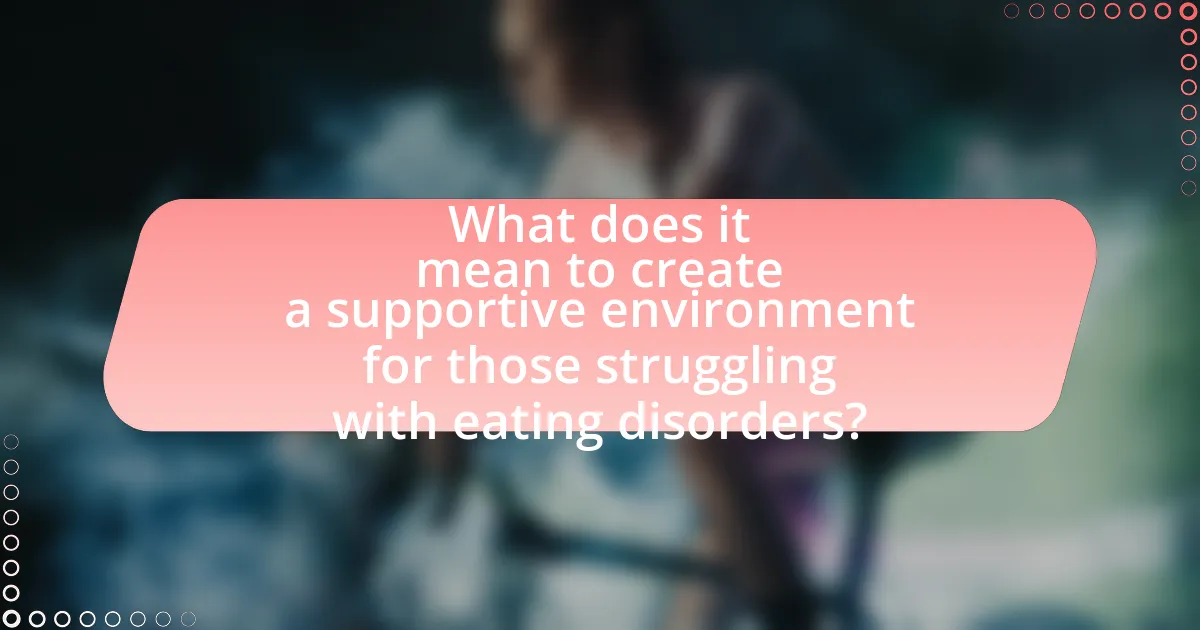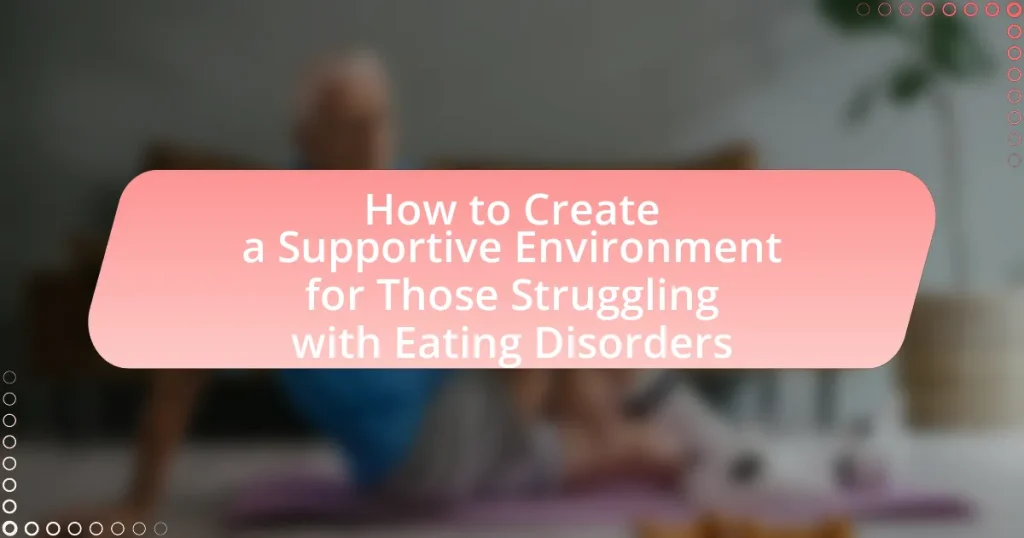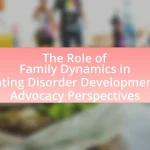Creating a supportive environment for individuals struggling with eating disorders involves fostering understanding, compassion, and open communication. This article outlines the significance of empathy and informed responses in enhancing recovery outcomes, emphasizing the role of family, friends, and professionals in providing essential support. It discusses common types of eating disorders, the importance of recognizing their signs, and effective communication strategies to promote healing. Additionally, the article highlights the impact of community involvement and ongoing support in maintaining a nurturing atmosphere for recovery, ultimately aiming to improve the mental health and well-being of those affected.

What does it mean to create a supportive environment for those struggling with eating disorders?
Creating a supportive environment for those struggling with eating disorders means fostering a space that promotes understanding, compassion, and open communication. This involves actively listening to individuals, validating their feelings, and avoiding judgmental attitudes or comments about food and body image. Research indicates that supportive relationships can significantly improve recovery outcomes, as seen in a study published in the Journal of Eating Disorders, which found that social support is a critical factor in the healing process for individuals with eating disorders. By encouraging healthy discussions around food and body positivity, a supportive environment can help individuals feel safe and empowered to seek help and share their experiences.
How can understanding eating disorders help in creating a supportive environment?
Understanding eating disorders is crucial for creating a supportive environment because it fosters empathy and informed responses among peers and caregivers. When individuals comprehend the complexities of eating disorders, including their psychological and physiological aspects, they can offer appropriate support rather than judgment. Research indicates that environments characterized by understanding and compassion significantly improve recovery outcomes; for instance, a study published in the Journal of Eating Disorders found that supportive relationships can enhance treatment adherence and reduce relapse rates. Thus, knowledge about eating disorders equips individuals to create spaces that promote healing and resilience.
What are the common types of eating disorders that require support?
The common types of eating disorders that require support include anorexia nervosa, bulimia nervosa, binge eating disorder, and avoidant/restrictive food intake disorder (ARFID). Anorexia nervosa is characterized by extreme restriction of food intake and an intense fear of gaining weight, leading to significant weight loss. Bulimia nervosa involves cycles of binge eating followed by compensatory behaviors such as vomiting or excessive exercise. Binge eating disorder is marked by recurrent episodes of eating large quantities of food without subsequent purging behaviors, often associated with feelings of loss of control. ARFID is characterized by an avoidance of certain foods or food groups, leading to nutritional deficiencies and significant weight loss. These disorders are recognized by mental health professionals as requiring comprehensive support and treatment due to their serious physical and psychological consequences.
Why is it important to recognize the signs of eating disorders?
Recognizing the signs of eating disorders is crucial for early intervention and effective treatment. Early detection can significantly improve recovery outcomes, as studies indicate that individuals who receive timely support are more likely to overcome their disorders. For instance, research published in the Journal of Eating Disorders shows that early intervention can reduce the duration and severity of eating disorders, leading to better long-term health and psychological well-being. Therefore, awareness of the signs enables friends, family, and professionals to provide necessary support and resources, fostering a healthier environment for those affected.
What role do family and friends play in supporting someone with an eating disorder?
Family and friends play a crucial role in supporting someone with an eating disorder by providing emotional support, understanding, and encouragement for recovery. Their involvement can significantly impact the individual’s motivation to seek treatment and adhere to recovery plans. Research indicates that social support from family and friends can lead to better treatment outcomes, as individuals with strong support networks are more likely to engage in therapy and maintain healthier behaviors. For instance, a study published in the Journal of Eating Disorders found that perceived social support is linked to lower levels of eating disorder symptoms, highlighting the importance of a supportive environment in the recovery process.
How can family members effectively communicate with someone struggling with an eating disorder?
Family members can effectively communicate with someone struggling with an eating disorder by approaching the conversation with empathy, active listening, and a non-judgmental attitude. Empathy allows family members to understand the emotional and psychological challenges faced by the individual, while active listening ensures that the person feels heard and validated. A non-judgmental attitude fosters a safe space for open dialogue, which is crucial for discussing sensitive topics related to eating disorders. Research indicates that supportive communication can significantly impact recovery outcomes, as individuals are more likely to engage in treatment when they feel understood and supported by their loved ones.
What are some common misconceptions that friends and family should avoid?
Friends and family should avoid the misconception that eating disorders are solely about food and weight. This belief undermines the complex psychological and emotional factors involved in these disorders. Research indicates that eating disorders often stem from deeper issues such as trauma, anxiety, or low self-esteem, rather than just a desire to lose weight (National Eating Disorders Association). Additionally, assuming that individuals with eating disorders can simply “just eat” or “stop” is misleading; recovery is a multifaceted process that requires professional support and understanding.
What are the key elements of a supportive environment for individuals with eating disorders?
A supportive environment for individuals with eating disorders includes empathy, open communication, and professional guidance. Empathy fosters understanding and reduces stigma, allowing individuals to feel safe sharing their experiences. Open communication encourages honest discussions about feelings and challenges, which can help in addressing the disorder effectively. Professional guidance, such as therapy and nutritional counseling, provides the necessary tools and strategies for recovery. Research indicates that environments characterized by these elements significantly improve treatment outcomes and emotional well-being for individuals facing eating disorders.
How can creating a safe space contribute to recovery?
Creating a safe space significantly contributes to recovery by fostering an environment where individuals feel secure, accepted, and free from judgment. This sense of safety encourages open communication, allowing individuals to express their feelings and struggles related to their eating disorders without fear of stigma. Research indicates that supportive environments can enhance emotional well-being and promote healthier coping mechanisms, which are crucial for recovery. For instance, a study published in the Journal of Eating Disorders found that individuals who participated in supportive group settings reported higher levels of self-acceptance and lower levels of anxiety, directly correlating with improved recovery outcomes.
What strategies can be implemented to foster open communication?
To foster open communication, implementing regular check-ins and creating safe spaces for dialogue are essential strategies. Regular check-ins, such as weekly meetings or informal catch-ups, encourage individuals to share their thoughts and feelings, promoting transparency. Creating safe spaces involves establishing environments where individuals feel comfortable expressing themselves without fear of judgment, which can be achieved through supportive group settings or one-on-one conversations. Research indicates that environments fostering open communication lead to improved emotional well-being and stronger relationships, particularly in contexts involving sensitive issues like eating disorders.
How can professionals contribute to a supportive environment?
Professionals can contribute to a supportive environment by fostering open communication and providing empathetic support to individuals struggling with eating disorders. By actively listening and validating the experiences of those affected, professionals create a safe space that encourages individuals to express their feelings and concerns. Research indicates that supportive interactions can significantly enhance recovery outcomes, as demonstrated in a study published in the Journal of Eating Disorders, which found that patients who felt supported by healthcare providers reported higher levels of satisfaction and engagement in their treatment. Additionally, professionals can implement educational programs that raise awareness about eating disorders, thereby reducing stigma and promoting understanding within the community.
What types of professionals are essential in supporting individuals with eating disorders?
Mental health professionals, registered dietitians, and medical doctors are essential in supporting individuals with eating disorders. Mental health professionals, such as psychologists and therapists, provide therapy and counseling to address the psychological aspects of eating disorders. Registered dietitians offer nutritional guidance and meal planning to help individuals develop a healthy relationship with food. Medical doctors monitor physical health and manage any medical complications arising from eating disorders. Research indicates that a multidisciplinary approach, involving these professionals, significantly improves treatment outcomes for individuals with eating disorders.
How can healthcare providers ensure they are creating a supportive atmosphere?
Healthcare providers can ensure they are creating a supportive atmosphere by actively fostering open communication and demonstrating empathy towards patients. This approach involves listening attentively to patients’ concerns, validating their feelings, and providing reassurance, which has been shown to enhance patient trust and engagement. Research indicates that empathetic communication can significantly improve treatment outcomes for individuals with eating disorders, as it helps to reduce feelings of isolation and anxiety. By prioritizing a non-judgmental and compassionate environment, healthcare providers can effectively support patients in their recovery journey.
What are some effective practices for creating a supportive environment?
Effective practices for creating a supportive environment for individuals struggling with eating disorders include fostering open communication, promoting understanding and empathy, and providing resources for professional help. Open communication allows individuals to express their feelings without fear of judgment, which is crucial for their recovery. Promoting understanding and empathy among peers and family members helps to reduce stigma and creates a safe space for discussion. Providing resources, such as access to counseling and support groups, ensures that individuals have the necessary tools to seek help. Research indicates that supportive environments significantly enhance recovery outcomes for those with eating disorders, as highlighted in studies published in the Journal of Eating Disorders, which emphasize the importance of social support in the healing process.
How can education and awareness programs help in building support systems?
Education and awareness programs can significantly enhance the development of support systems for individuals struggling with eating disorders by providing essential knowledge and fostering empathy among community members. These programs educate participants about the complexities of eating disorders, including their psychological, emotional, and physical aspects, which helps to dismantle stigma and misconceptions. For instance, a study published in the Journal of Eating Disorders found that increased awareness leads to more supportive attitudes and behaviors towards affected individuals, thereby creating a more understanding environment. Furthermore, these programs often include training on how to effectively support someone in distress, equipping friends, family, and peers with the skills needed to offer appropriate help. This combination of knowledge and practical support strategies is crucial in building robust support systems that can positively impact recovery outcomes.
What role does community involvement play in supporting individuals with eating disorders?
Community involvement plays a crucial role in supporting individuals with eating disorders by fostering a sense of belonging and providing essential resources. Engaging community members in awareness campaigns, support groups, and educational programs can significantly reduce stigma and encourage individuals to seek help. Research indicates that social support from community networks enhances recovery outcomes, as individuals feel less isolated and more understood. For instance, a study published in the Journal of Eating Disorders found that peer support groups led to improved emotional well-being and reduced symptoms among participants. Thus, active community participation not only aids in recovery but also promotes a healthier environment for those affected by eating disorders.
How can one maintain a supportive environment over time?
To maintain a supportive environment over time, consistent communication and active listening are essential. Regularly checking in with individuals struggling with eating disorders fosters trust and openness, allowing them to express their feelings and needs. Research indicates that ongoing support from peers and family significantly contributes to recovery, as highlighted in the study “The Role of Family Support in the Recovery from Eating Disorders” by Le Grange et al., which emphasizes that emotional support can enhance treatment outcomes. Additionally, creating a non-judgmental atmosphere encourages individuals to share their experiences without fear of criticism, reinforcing their sense of safety and belonging.
What are some ongoing strategies for sustaining support for individuals in recovery?
Ongoing strategies for sustaining support for individuals in recovery from eating disorders include establishing regular check-ins, fostering open communication, and creating a structured support network. Regular check-ins, such as weekly meetings or therapy sessions, help individuals feel accountable and connected to their support system. Open communication encourages individuals to express their feelings and challenges, which can lead to timely interventions. Additionally, a structured support network, including family, friends, and support groups, provides a sense of community and shared experience, which is crucial for long-term recovery. Research indicates that social support significantly enhances recovery outcomes, as individuals with strong support systems are more likely to maintain their progress and avoid relapse.
How can one measure the effectiveness of a supportive environment?
One can measure the effectiveness of a supportive environment by assessing the improvement in individuals’ mental health and well-being, specifically through metrics such as reduced anxiety and depression levels, increased self-esteem, and enhanced coping skills. Research indicates that supportive environments, characterized by empathy, understanding, and open communication, lead to significant positive outcomes for individuals struggling with eating disorders. For instance, a study published in the Journal of Eating Disorders found that participants in supportive settings reported a 30% decrease in eating disorder symptoms over six months, demonstrating the tangible benefits of such environments.
What practical tips can be implemented to support someone with an eating disorder?
To support someone with an eating disorder, encourage open communication and create a non-judgmental environment. This approach fosters trust and allows the individual to express their feelings and struggles without fear of criticism. Additionally, educate yourself about eating disorders to better understand the challenges faced by the person, which can enhance empathy and support. Offering to accompany them to therapy sessions or support groups can also provide practical assistance and show that they are not alone in their journey. Furthermore, avoid discussing weight, food, or body image in a negative context, as this can exacerbate their condition. Research indicates that supportive relationships significantly contribute to recovery outcomes in individuals with eating disorders, highlighting the importance of a compassionate and informed support system.


